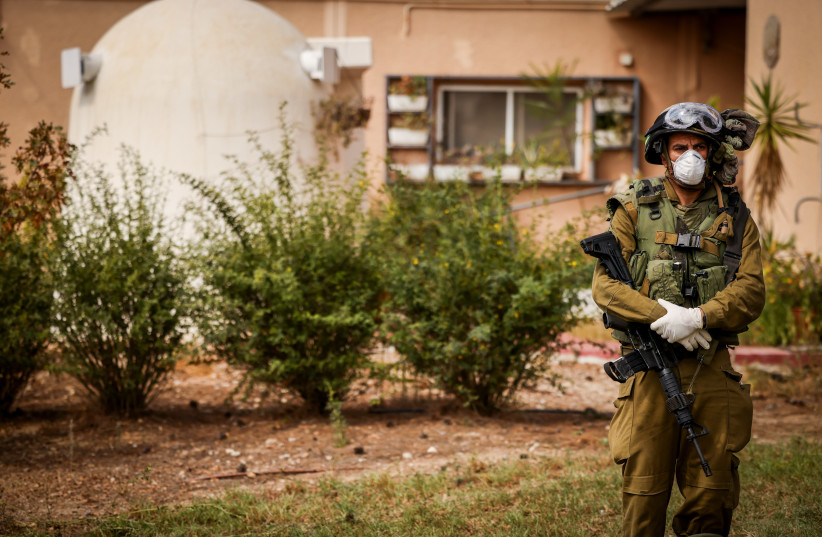The lobby of the David Hotel in the Dead Sea was packed on Tuesday, but it was not the joyful hubbub of holiday goers who filled the space - it was people from the south still trying to process the trauma they experienced over the weekend in Hamas's massive attack.
Sitting in small groups, most of the people were evacuees from towns close to the border with Gaza while others had come to lend support to their loved ones.
One such group consisted of a couple, Haim and Hannah, who were among the establishers of Kibbutz Beeri which was hit massively by Hamas.
Haim told The Jerusalem Post that he spent the whole of Saturday in his sheltered room with his son and grandson before soldiers came to evacuate them. Hannah, who had gone to spend the day in Tel Aviv, was kept updated throughout the day by their son.
Luckily, the terrorists did not break into the couple's home, but Haim and his family were kept updated on the terrible fates of their friends and neighbors through messages sent in various WhatsApp groups and Facebook.

Rescue services ran into fighting
All the while, Hannah was trying to alert emergency forces and get help for her husband, son, and grandson but said that she was not given a real response.
"Magen David Adom and fire and rescue services were barred from getting to us because there was fighting all along the access road into the kibbutz," said Haim.
But the lack of aid did not end when they were evacuated, Hannah charged. Any help they've gotten, she said, came from civilian volunteers who were providing therapy, clothes, medication, and more.
"Today, the police and the Welfare and Social Services Ministry came to speak to us for the first time," she said on the fourth day of the war.
Their fellow kibbutz residents were also not getting a response regarding missing people.
“We’re dying of worry and they aren’t telling us who’s alive and who’s dead,” she said.
This sentiment was echoed by Oren from Sderot who accused the government of lying about the amount of information it's giving the families.
"There is no state," added Hannah. “We need to reestablish the state from scratch, we need to reestablish the kibbutz and the whole Eshkol Regional Council. All the kibbutzim were destroyed.”
Trapped in the shelter, listening to the nightmare unfold
Dorit and Doron from Sderot talked about how their family had also been trapped in their shelters all day as they heard the nightmare going on outside. Their 12-year-old son saw footage on social media.
A similar story came from Orit, also from Sderot, who had evacuated with her five children, the youngest of whom is seven. She spoke to the Post from the Dead Sea Mall where she was doing her best to buy her children the essentials they hadn't had time to pack when evacuating in the few shops that were open.
Itai from Kibbutz Beeri talked about experiencing the attack with two children aged five and two. His family had escaped from their sheltered room to his brother's which was 30 meters away so that they would have the protection of his brother being armed.
Asked how they handled the situation with such young children, he referenced Life is Beautiful - a movie about a Jewish father in the Holocaust who tries to protect his son from the understanding of the atrocities by turning it into a game.
“We tried to build them a different world so that they wouldn’t know what they don’t need to know," said Itai.
Among these survivors is a sense of hopelessness and despair as they describe undergoing an attack the likes of which they had never seen. Most people were quick to point out that they are used to rocket fire and red alert sirens and that it doesn't faze them anymore, but this was something new and different that broke them.
But not all people could bear to tell their stories. Some could not speak of what they went through, and their trauma is clear in the look on their face at the thought of reliving their experiences.
"In a display of unwavering compassion and solidarity, the Tamar Council, has opened its doors to host evacuees from the Gaza Strip amidst the recent conflict," said the Tamar Regional Council in a statement. "The council, in collaboration with the Residential Resilience Team, has worked diligently to provide shelter, food, and medical assistance to those in need. The hotel area at Ein Bokek, and Kibbutz Ein Gedi are currently hosting 6,000 evacuees who have had to flee their homes with no more than a handbag and clothes on their backs.
"A request was made to all Israeli nationals asking for food, money, clothes, supplies, baby necessities, medicines, welfare equipment, and much more which was met with an overwhelming response from the Israeli public including the municipality’s local residents. The council offices are being manned in three separate shifts covering the whole day and into the late evening coping with questions and providing information to the evacuees, the welfare office in on site 24/7 for emotional support, medical staff are on site 24/7 for physical support. The complete operation is led by Mr. Nir Wanger, Head of the Tamar Regional Council and includes the assistance of many local residents."
